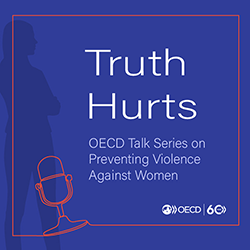Social and welfare issues
Truth Hurts: OECD Talk series on Preventing Violence Against Women
|
|
Truth Hurts is an OECD talk series featuring informal conversations with experts and practitioners working with survivors of gender-based violence. This series is hosted by Monika Queisser, Senior Counsellor and Head of the Social Policy Division at the OECD. Violence against women (VAW) remains a global crisis. Worldwide, more than one in three women have experienced physical and/or sexual intimate partner violence or non-partner sexual violence in their lifetime. Find out more about OECD work on Ending Violence Against Women |
 Episode 1: Sheltering from domestic violence
Episode 1: Sheltering from domestic violence
Violence against women is one of the most widespread, persistent and devastating human rights violations in the world. More than one in three women worldwide say they experienced physical or sexual violence in their lifetime. The pandemic has made things worse: confinement trapped millions of women around the world at home with their abusers. In the first episode of the OECD podcast series “Truth Hurts” Charlotte Kneer, CEO of Reigate and Barnstead Women’s Aid, shares how her personal experience with intimate partner violence brought her to running shelters, why it can be so difficult to leave an abusive relationship, and what governments must do to prevent domestic violence against women and offer better support for survivors. Listen to Episode 1
 Episode 2: The unknown brain injuries of domestic violence survivors
Episode 2: The unknown brain injuries of domestic violence survivors
Pioneering research is showing that brain trauma is pervasive in cases of domestic violence against women. Depression, anxiety, memory loss, disorientation, and sleep problems are all potential symptoms of someone who has experienced a traumatic brain injury. Recognising and treating brain injuries is key to help survivors of domestic violence. In the second episode of the OECD podcast series “Truth Hurts” Eve Valera, Associate Professor in Psychiatry at Harvard Medical School shares with Monika Queisser her research on brain trauma and women who have survived domestic abuse and why it is so important to raise awareness with policy makers, women’s shelters, and first-responders.
 Episode 3: A policeman’s journey to activism: Combatting violence against women
Episode 3: A policeman’s journey to activism: Combatting violence against women
In this episode of Truth Hurts, Monika Queisser speaks with Bert Groen, a former police officer turned activist in the fight against gender-based violence in the Netherlands. He shares his experiences in dealing with violence against women, explains how the police force and the justice system more broadly can better help survivors of domestic violence, why it is so important to integrate all services survivors need in one place, and how Family Justice Centers can be a source of hope and empowerment.
Episode 4: When the only safe place is work: How employers can fight domestic violence
In this episode of Truth Hurts, Monika Queisser speaks with Margaret Johnston-Clarke, the Global Chief Diversity, Equity and Inclusion Officer for the L'Oréal Group, about actions employers can take. In the One in Three Women Network, multinational companies work together to support survivors amongst their own employees with concrete measures. For more information and how to join the network, please contact Aurore Pereira de Oliveira at Fondation FACE (a.pereira-de-oliveira@fondationface.org).
Episode 5: Don’t blame victims, focus on perpetrators: Making services work for domestic violence survivors
James Henderson was 10 years old when he experienced how policies designed with the best intentions can have devastating effects for families affected by domestic violence. He tells OECD’s Monika Queisser about his personal journey from surviving family abuse to becoming a Social Worker, Probation Officer, Battering Intervention Provider and Expert Trainer on Tackling Domestic Violence. He explains why we often blame the victims, that not enough is done to stop the perpetrators, and how social services must listen to the families they are trying to help.
Related Documents


